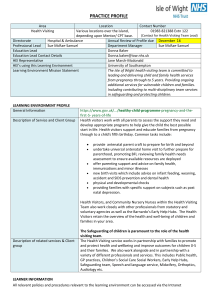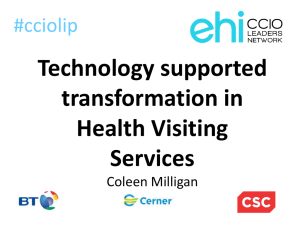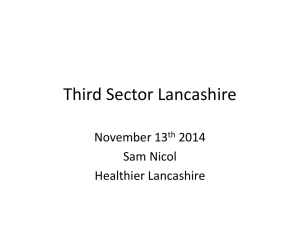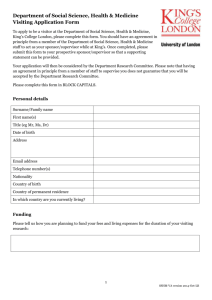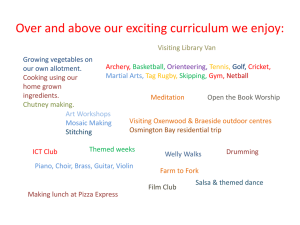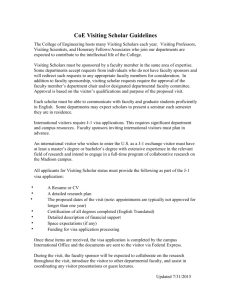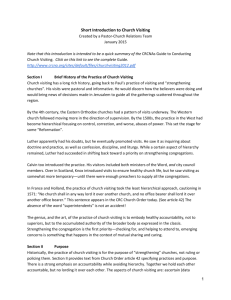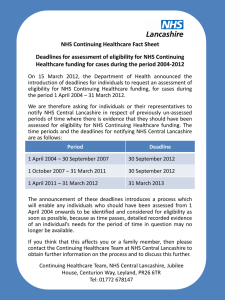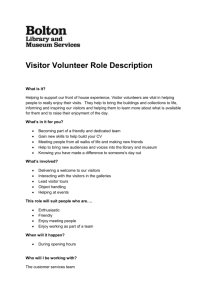health visiting further information
advertisement
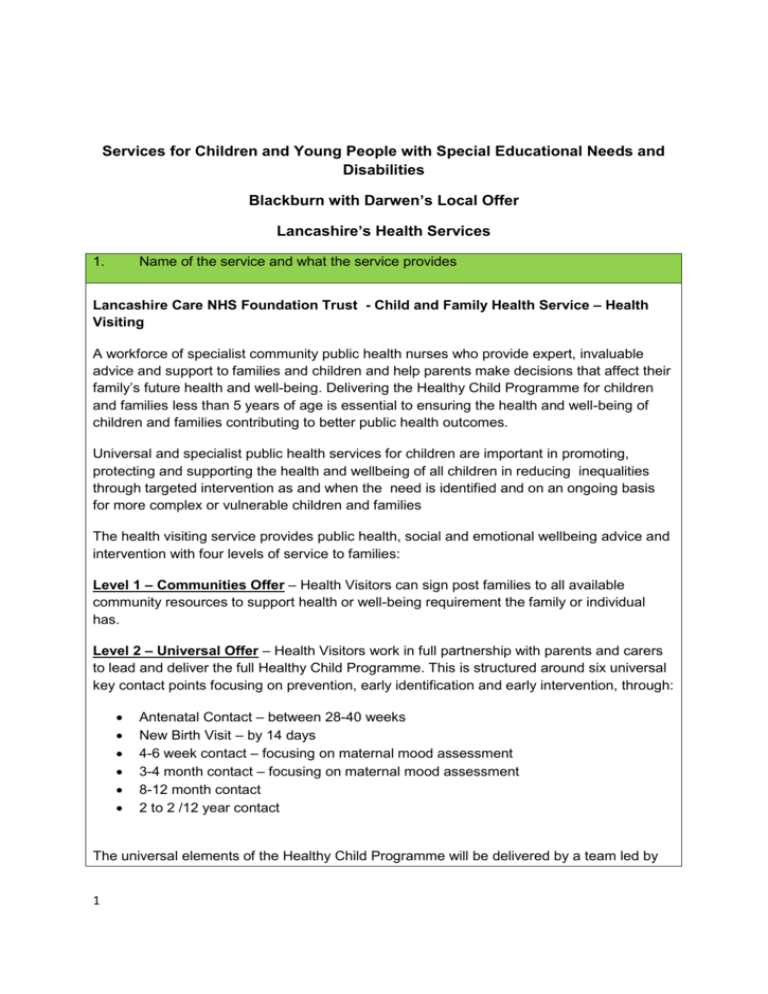
Services for Children and Young People with Special Educational Needs and Disabilities Blackburn with Darwen’s Local Offer Lancashire’s Health Services 1. Name of the service and what the service provides Lancashire Care NHS Foundation Trust - Child and Family Health Service – Health Visiting A workforce of specialist community public health nurses who provide expert, invaluable advice and support to families and children and help parents make decisions that affect their family’s future health and well-being. Delivering the Healthy Child Programme for children and families less than 5 years of age is essential to ensuring the health and well-being of children and families contributing to better public health outcomes. Universal and specialist public health services for children are important in promoting, protecting and supporting the health and wellbeing of all children in reducing inequalities through targeted intervention as and when the need is identified and on an ongoing basis for more complex or vulnerable children and families The health visiting service provides public health, social and emotional wellbeing advice and intervention with four levels of service to families: Level 1 – Communities Offer – Health Visitors can sign post families to all available community resources to support health or well-being requirement the family or individual has. Level 2 – Universal Offer – Health Visitors work in full partnership with parents and carers to lead and deliver the full Healthy Child Programme. This is structured around six universal key contact points focusing on prevention, early identification and early intervention, through: Antenatal Contact – between 28-40 weeks New Birth Visit – by 14 days 4-6 week contact – focusing on maternal mood assessment 3-4 month contact – focusing on maternal mood assessment 8-12 month contact 2 to 2 /12 year contact The universal elements of the Healthy Child Programme will be delivered by a team led by 1 Health Visitors. The core elements of the healthy Child Programme include: Health & Development reviews Screening is an integral part of the Healthy Child Programme Immunisations – immunisations should be offered to all children and their parents Promotion of social and emotional development Support for Parenting – using evidenced-based programmes Effective promotion of health and behavioural change Sick Children – supporting parents to know what to do when their child is sick Children with additional needs – early identification , diagnosis and help Level 3 – Universal Plus Offer –Health Visitors identify families and children that are based within the service that need a swift response leading to a co-ordinated tailored package of additional care e.g. a mum with post natal depression, a sleepless baby, infant feeding support, support for families who have a child with a long-term health issue or additional health need and support in the antenatal period if needed. Level 4 – Universal Partnership Plus Offer – Health Visitors work in partnership with partner agencies e.g. Children Centres, Social Workers, Mental Health Practitioners in the provision of intensive multi agency targeted packages where there are identified health needs. By working together in partnership there is improved co-ordination of services and intervention so as to offer greater control and choice for the family, with improved service user experience and improved health outcomes. To avoid care becoming unnecessarily complicated for families the service: 2. Ensures timely early intervention Prevents health needs deteriorating Avoids duplication between professionals Ensures families receive a seamless service Address and contact details and area covered Health Visitors are based within the local communities and details of each base can be found on the Lancashire Care website highlighted below. The geographies covered are Blackburn with Darwen, Central Lancashire, East Lancashire, and West Lancashire The website can be found at: http://www.lancashirecare.nhs.uk/Services/ChildrenFamilies/CFHS/EYPB.php Lead contacts for Health Visitor service: 2 Cheryl Forrest – Service Integration Manager: cheryl.forrest@lancashirecare.nhs.uk Anne Lewis – Service Integration Manager: anne.lewis@lancashirecare.nhs.uk All individual teams have an answerphone service for contact out of hours. 3. The service is for All families with a child aged 0-5 years and pregnant women who currently reside within Lancashire. The service ensures equal access for all children up to school entry and their families, irrespective of age, disability, gender, disability, race etc. The health visiting service within Lancashire Care has developed a Family Health Assessment tool to complete in partnership with a family to determine the level of need. This ensures that all aspects of children and their family’s lives are addressed. After completion the health visitor will make an analysis and in partnership with the family agree the level of need at that time. If the intervention is not provided under the health visiting offer, the service can refer the child or young person to other services such as; CAMHS, occupation therapy, speech and language therapy etc. 4. Accessing the Service Health visiting is a universal service and aims to include everyone. The service is free of charge and no waiting lists apply. The service is notified of new births within Lancashire on a daily basis via the Child Health System. Any parent or family can make contact with the service although sometimes other agencies contact health visitors and refer families to them. These services may include: GPs Midwives, School nurses Health visitors working in other areas Allied health professionals, staff at acute trusts, community pediatricians Children's Centre’s or children's services Police and other agencies Once the team has received a referral it identifies the child’s and family's needs, and draws up a specific care package. Parents are able to call their local team directly using the information provided on the trust site - http://www.lancashirecare.nhs.uk/Services/Children- 3 Families/CFHS.php Participation is a priority within the health visiting service and within each of the health visiting teams is a ‘participation champion’. A formal service user feedback survey was carried out by the 25 health visiting teams in January/February 2014.The key findings from the 1397 responses included: 5. 99% of respondents are either likely or very likely to recommend the service to someone they care about 99% of respondents reported that they were involved as much as they wanted either most of the time or at all times 96% of respondents reported that they were treated with dignity and respect all of the time rising to 99.5% to include most of the time Decision making processes used to determine who is eligible to receive a service. All families with a child 0-5 years and pregnant women who currently reside within Lancashire are eligible to receive the health visiting service. The core contacts of the Health Visiting Service are: Ante Natal Visit Primary Visit before the baby is 14 days old Maternal Mood assessment between 4-6 weeks and 3-4 months 8-12 month assessment 2-21/2 year assessment Health Visitors offer four levels of delivery – Community, Universal, Universal Plus and Partnership Plus. Some children will receive different levels of the service dependent on their need and this will be explained to families. Embedded in health visiting practice is the ‘Common Assessment Framework’ (CAF) which is a shared assessment and planning tool for use across all children’s services. It helps in the early identification of needs of children, young people and their families. The CAF promotes a co-ordinated approach on how these needs should be met by building and improving on multi-agency working reducing confusion for families by reducing the number of inappropriate and duplicate inter-agency requests of service. 6. Methods of communication with service users/patients and how they are involved in decision making/planning. All 25 teams have an annual service user participation plan in place. Previous methods of 4 communication with service users and patients has involved the use of questionnaires to generate attitudes towards what the service does well and what can be improved. Other methods of communication include: Information leaflets; Customer Care, Sharing Information With us, Feedback forms available on the web link: http://www.lancashirecare.nhs.uk/Services/Children-Families/CFHS/EYPB.php On-line survey which can be accessed via the health visitor’s mobile device following key contacts with the family ‘Cloud’ boards within baby clinic settings where service users can voice their views about the service on information board in clinical areas. In order to overcome communication barriers language line can be is used to communicate with parents/carers whose first language is not English. Within the health visiting teams some staff are bi-lingual, there are link workers and in certain scenarios specific interpreters are utilised. Parents or carers will be present at health visits and will therefore be able to ask questions specific to their child’s care. Health Visitors are involved in the delivery of Antenatal Education provision to parents which includes: ‘Birth, Bump & Beyond’. This is an antenatal course for mums-to-be and their partners. Health Visitors link very closely with the Children Centres and are fully informed of the training that is being provided e.g. Parenting courses/training courses/emotional wellbeing courses 7. Service Accessibility. Parents are offered a choice of location for visits which best meets their needs however the majority of visits are carried out within the home setting and is therefore accessible to all. Baby Clinics are held in local Health Centres or Children Centres which are fully wheelchair accessible, child friendly and have toilet and changing facilities. The core hours of the service are 09:00 – 17:00 hours but the service offers flexibility from 08:00 – 20:00 hours to accommodate families’ needs Monday to Friday. The service are piloting a Saturday morning ‘baby/drop in clinic’ from September 2014 – January 2015 from 10:00 – 12:00 hours at St Peters Health Centre, Burnley to offer flexibility of service to accommodate families need. All teams have an answerphone service which can be used for out of hours contact. 8. 5 Workforce Skills and Training The health visiting service have a robust development framework in place to assess staff competency and ensure that every member of staff is enabled and empowered to deliver safe and effective care which is person centred and gives children, young people and their families a positive experience of their involvement with our services. All staff attend the Clinical Development Groups which provides a forum to update staff and show case examples of the excellent work taking place and share best practice. Within Lancashire Care, pathways to specialist services (e.g. Children’s Integrated Therapy and Nursing Service, Children’s Community Nurses, Paediatricians) have been developed as well as the Common Assessment Framework to ensure that the needs of families with complex health needs are met. 9. Contacts for further information The first point of contact for a parent/carer to discuss something about their child’s care would be to the practitioner delivering the care, e.g. the health visitor. If the parent/carer has any urgent worries or concerns they should contact the Team Leader of the appropriate team (details can be found on the Trust website). All children who are eligible for the health visiting service will receive the core universal programme. Health visitors will be able to address whether a child needs a higher level of service and would benefit from this support. The core hours of the service are 09:00 – 17:00 hours but the service offer flexibility from 08:00 – 20:00 hours to accommodate families’ need Monday to Friday. All teams have an answerphone service for all out of hours contact. 10. Feedback Queries, compliments and complaints can be discussed with a member of staff delivering the child or young person’s care, however, if you wish to make a formal complaint or compliment 6 the Trust process can be followed which is detailed on the website: http://www.lancashirecare.nhs.uk/contact-us/Complaints.php. Incidents and complaints which are received are thoroughly investigated and lessons learned shared within the service. Any feedback about the service can also be provided using the following link: https://www.snapsurveys.com/wh/s.asp?k=140368637367 7
